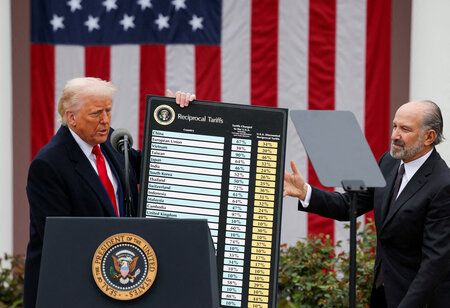By Global Consultants Review Team
 In a significant escalation of his trade agenda, former US President Donald Trump on Monday announced sweeping new tariffs targeting key Asian, African, and Eastern European economies. The latest move came as Trump said he would be posting letters to the leaders of a dozen countries, formally notifying them of the steep new import duties.
In a significant escalation of his trade agenda, former US President Donald Trump on Monday announced sweeping new tariffs targeting key Asian, African, and Eastern European economies. The latest move came as Trump said he would be posting letters to the leaders of a dozen countries, formally notifying them of the steep new import duties.
Speaking through his social media platform, Truth Social, Trump revealed that the US will impose a 25 percent tariff on goods from Japan and South Korea starting August 1, 2025, with even higher rates ranging up to 40 percent on other nations. The letters, publicly posted by Trump, were addressed to the heads of state of 14 countries, including Japan, South Korea, Malaysia, Thailand, Indonesia, Bangladesh, Myanmar, Laos, Cambodia, Kazakhstan, Serbia, South Africa, Tunisia, and Bosnia & Herzegovina.
The letters to the Southeast Asian countries carried a stern warning: they must not retaliate by increasing their own import taxes. “If for any reason you decide to raise your Tariffs, then, whatever the number you choose to raise them by, will be added onto the 25 percent that we charge,” Trump wrote directly to Japanese Prime Minister Shigeru Ishiba and South Korean President Lee Jae-myung. Observers note this could heavily impact the auto and electronics sectors of Japan and South Korea, already reeling from global supply chain pressures.
The latest tariff announcement comes as part of Trump’s broader “reciprocal tariff” strategy, launched with his so-called Liberation Day tariffs in April. Countries are under pressure to negotiate new trade agreements to avoid these sharp duties quickly. Only a handful, including the UK, Vietnam, and tentatively China, have secured deals to prevent the tariffs.
India, meanwhile, is racing against time. New Delhi and Washington have been engaged in intense discussions to finalise a bilateral trade pact before the July 9 deadline. Without an agreement, a combined 26 percent tariff on Indian goods (16 percent new and 10 percent existing) is set to take effect. Trump indicated that India and the US are “close to making a deal,” offering hope that the tariff letter to New Delhi could be delayed or avoided.
The announcement rattled global markets. Wall Street saw notable declines, with the S&P 500 slipping by nearly 0.8 percent, while Asian markets posted mixed reactions. As the August 1 deadline approaches, businesses worldwide brace for the impact of Trump’s letters, which could reshape global trade relationships in the months ahead.
We use cookies to ensure you get the best experience on our website. Read more...